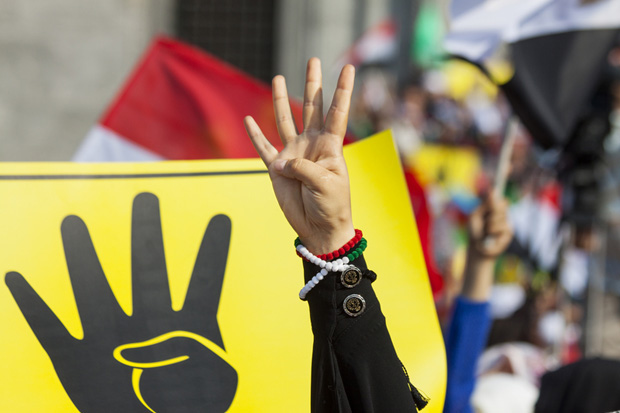 In a new sign that Egypt’s military-backed regime is widening its crackdown on dissent, three prominent activists and symbols of the January 2011 Revolution were sentenced to 3-year jail terms by a Cairo court this week.The court also ordered the activists to pay a fine of LE 50,000 each .The case has fuelled fears of increased government repression in a country wracked by violence since the toppling of Islamist President Mohamed Morsi by military-backed protests in July.
In a new sign that Egypt’s military-backed regime is widening its crackdown on dissent, three prominent activists and symbols of the January 2011 Revolution were sentenced to 3-year jail terms by a Cairo court this week.The court also ordered the activists to pay a fine of LE 50,000 each .The case has fuelled fears of increased government repression in a country wracked by violence since the toppling of Islamist President Mohamed Morsi by military-backed protests in July.
On Thursday, founder of the April 6 Youth Movement Ahmed Maher, member of the group’s political bureau Mohamed Adel and political activist Ahmed Douma began a hunger strike to protest “harsh treatment” at Cairo’s Torah Prison where they are being held. The pro-democracy activists were among 51 activists detained last month after organizing a demonstration to protest a controversial new law that the government claims will “regulate protests”. They were accused of allegedly “assaulting police officers, thuggery and organizing a protest without obtaining a permit from the authorities.” Rights groups have condemned the jail sentences, expressing concerns that the Egyptian authorities were “reversing the hard-earned gains of free speech and assembly acquired following the January 2011 uprising that toppled Hosni Mubarak.
In a statement posted on the April 6 website, the activists denounced the “inhumane conditions” they have endured in prison . They also complained of maltreatment and abuse by fellow inmates.
The activists’ statement coincided with a government announcement that the Muslim Brotherhood had been declared a “terrorist organisation”–a move signaling further marginalisation of the Islamist group in the bitterly polarized country .The government decision came a day after a fatal suicide bombing that targeted the Security Directorate in the Nile Delta city of Mansoura. At least 12 people were killed and 130 others were wounded in the attack for which a Jihadi group – Ansar Beit al Maqdis–later claimed responsibility. Despite the Muslim Brotherhood’s denunciation of the terror attack on their official website Ikhwanweb, the government announced plans to criminalize the group’s activities and freeze its funds–a move the analysts feared would lead to greater radicalization of the group and plunge the country into civil strife.
General Coordinator of the April 6 Youth Movement, Amr Aly criticised the government decision saying that ‘branding the Brotherhood a terrorist organisation would not halt the attacks but would end hopes for stability, plunging the country in a state of chaos.”
As Egyptians were still reeling from the shock of Tuesday’s deadly bombing in Mansoura, news broke of a second blast in Cairo’s residential neighborhood of Nasr City on Thursday . The latest explosion–caused by a homemade bomb–injured five passengers on a bus.raising fears of a fresh spate of attacks ahead of a popular referendum on the new constitution scheduled for mid January.
Hours after Thursday’s attack, 16 Muslim Brotherhood supporters were arrested in the Nile Delta province of Sharkiya on charges of “promoting the ideology of the Muslim Brotherhood group, distributing leaflets, and inciting violence against the army and police.” Egypt’s privately-owned TV channel CBC meanwhile, announced the numbers for a new Hotline, urging citizens to report people they suspect of having links to the “terrorist group.”
The recent repressive measures have been described by analysts as a “dramatic escalation in a long-running feud between Egypt’s security agencies and the Islamist group intended to paralyse the latter and block any space for the Brotherhood in the political process.” But with the crackdown now expanding to target secular revolutionary activists, many are concerned that Egypt’s “democratic transition” may have taken a wrong turn, leaving the country on the brink of a civil war that may tear it apart.




